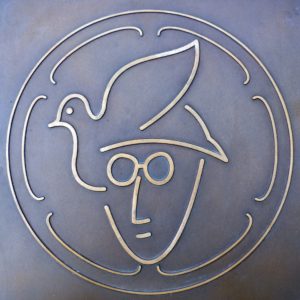Do not keep silence; do not hold your peace or be still.
Psalm 83:1
When I was nine years old I felt, for the first time in my young life, that I lived at the centre of the universe. John Lennon — yes, the John Lennon — was encamped in a hotel room in Montreal, my hometown, not too far from where I lived. To make matters even more exciting, he used the opportunity to record and release one of his most influential songs ever. Unfortunately for me, I misunderstood the lyrics when I first heard them and I wondered why he was asking us to ‘Give Peas a Chance’? For what? Were peas oppressed? Were they low on the pecking order of grocery produce? As the only one who could speak English in my French neighbourhood band, I bore the responsibility of explaining the lyrics. There was no Google translate back then. I took the task seriously.
“John believes that all things need to be treated equally,” I explained wisely, and then we all burst into a chorus of ‘Give Peas a Chance.’ I had the word wrong, but the sentiment was correct.
It wasn’t until some time later that I understood that Lennon was engaged in a remarkably performative protest of the Vietnam War, and that his call to activism would help set the scene for a younger generation to use their youth, their idealism, and their creativity as a way to challenge the Military Industrial Complex. These were heady days, where protests rocked the nation and young people seemed to take centre stage, fighting for love and peace. The fact that some of these protests turned violent seems to speak pointedly to the human condition, and our sometimes pathological inability to follow a truly peaceful path. It is also a reflection, however, of how systems of government and control at times fear peace and resort to violence as a way to restore a tenuous and oppressive order. This is certainly more visible under oppressive regimes, but it is actually a familiar tactic everywhere.
We may well ask ‘why?’ and I suspect part of the answer is that for many, peace is terrifying. So many of our institutional structures depend on conflict to survive. Fear of the other allows some nations to use excessive control to regulate behaviour. Tribal lines can be exploited to keep citizens at war with each other so that ruling elites can profit from their misery. Divide and conquer. It’s an age-old formula. But it is also ingrained in the human psyche. I once asked a bully why he loved to torment others. His answer, before sharing a knuckle sandwich with me for my troubles, was to say that he was simply bored. Conflict gave him purpose, I suppose. Of course, years later I learned of his abusive home, his brutal parent, and another piece of the puzzle was revealed: violence begets violence.
In some ways this is why Jesus’s call to turn the other cheek is so radical … and hard to do. Interestingly, the word peace (or peaceful) appears some 340 times in the Bible. War (or warrior) appears over 580 times. So much of the Good Book is about the predations that one human, one community, or one nation, perpetrated against another. And this saga has not changed in the last two thousand years, except that our technology has allowed us to be more lethal and unforgiving. Ironic, really, when our technology has also arguably presented us with the conditions to eradicate suffering, abuse and war.
Despite our proclivity towards aggression, peace defines and shapes what makes us most fully human. We may wonder why something so necessary and central to our humanity appears so often to be a struggle, and yet this too reflects our fallen selves, and points the way to our salvation. In a talk marking the 54th World Day of Peace on the 1st of January 2021, Pope Francis made the point that ‘there can be no peace without a culture of care.’ Creating such a culture, however, is an all-encompassing process. Peace isn’t simply about inner comfort in a stressful age — though that too is important. It is also about protecting biodiversity, energy needs, immigration channels. From an international perspective, peace is about cooperation and dialogue, something that we struggle to do even at the local level — even in a country like Canada that ranks 6th on the Global Peace Index.
The difficulty of the task, however, shouldn’t be a reason to avoid it. If anything it is incentive for us to draw on our faith life, on our common humanity, and on our connected need to survive, so that we redraw the narrative around what matters and what does not. It is critical, more than ever, that we find a way to speak to and heal the ‘open wounds,’ as Pope Francis calls our conflicts, so that we can ‘work boldly and creatively to initiate processes of healing and renewed encounter.’ This is true for historic wrongs and desperately needed reconciliations. It is needed between warring nations and age-old enemies. And of course it is true of our own more local conflicts and struggles. In the end, as Matthew tells us, “Blessed are the peacemakers for they shall be called the children of God.” (Mt 5: 9). For that reason alone, and to misquote John Lennon, we must give peas a chance.








